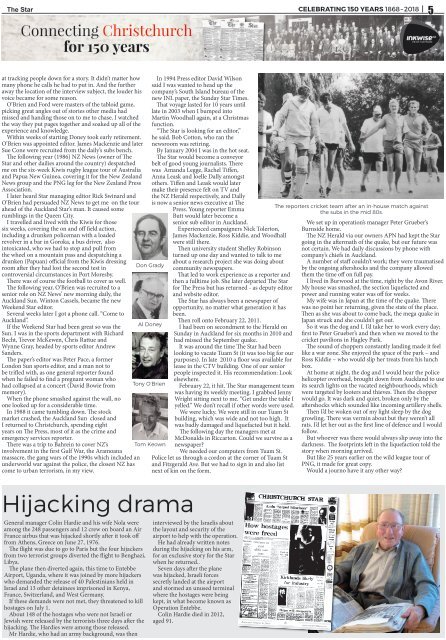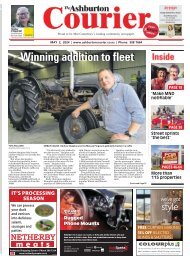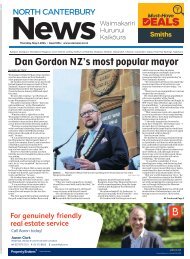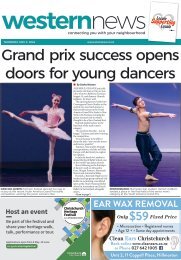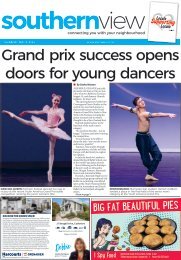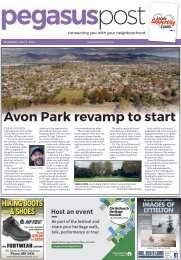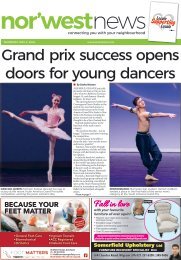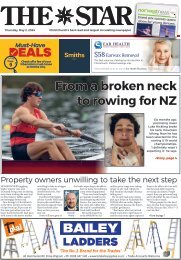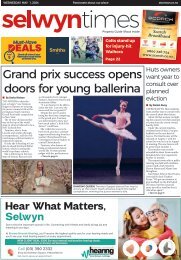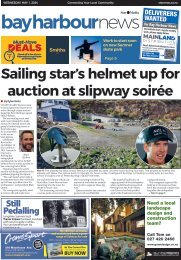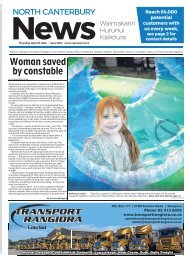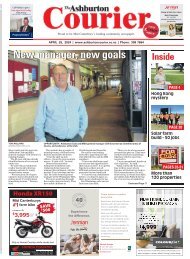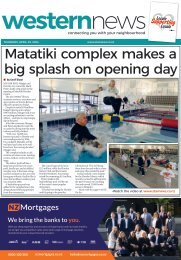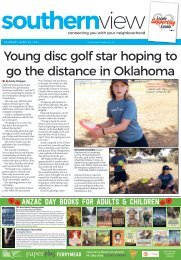The Star: July 05, 2018
You also want an ePaper? Increase the reach of your titles
YUMPU automatically turns print PDFs into web optimized ePapers that Google loves.
<strong>The</strong> <strong>Star</strong> CELEBRATING 150 YEARS 1868 – <strong>2018</strong><br />
5<br />
Connecting Christchurch<br />
for 150 years<br />
at tracking people down for a story. It didn’t matter how<br />
many phone he calls he had to put in. And the further<br />
away the location of the interview subject, the louder his<br />
voice became for some reason.<br />
O’Brien and Ford were masters of the tabloid game,<br />
picking great angles out of stories other media had<br />
missed and handing those on to me to chase. I watched<br />
the way they put pages together and soaked up all of the<br />
experience and knowledge.<br />
Within weeks of starting Doney took early retirement.<br />
O’Brien was appointed editor. James Mackenzie and later<br />
Sue Cone were recruited from the daily’s subs bench.<br />
<strong>The</strong> following year (1986) NZ News (owner of <strong>The</strong><br />
<strong>Star</strong> and other dailies around the country) despatched<br />
me on the six-week Kiwis rugby league tour of Australia<br />
and Papua New Guinea, covering it for the New Zealand<br />
News group and the PNG leg for the New Zealand Press<br />
Association.<br />
I later heard <strong>Star</strong> managing editor Rick Swinard and<br />
O’Brien had persuaded NZ News to get me on the tour<br />
ahead of the Auckland <strong>Star</strong>’s man. It caused some<br />
rumblings in the Queen City.<br />
I travelled and lived with the Kiwis for those<br />
six weeks, covering the on and off field action,<br />
including a drunken policeman with a loaded<br />
revolver in a bar in Goroka, a bus driver, also<br />
intoxicated, who we had to stop and pull from<br />
the wheel on a mountain pass and despatching a<br />
drunken (Papuan) official from the Kiwis dressing<br />
room after they had lost the second test in<br />
controversial circumstances in Port Moresby.<br />
<strong>The</strong>re was of course the football to cover as well.<br />
<strong>The</strong> following year, O’Brien was recruited to a<br />
senior role on NZ News’ new morning daily, the<br />
Auckland Sun. Winton Cassels, became the new<br />
Weekend <strong>Star</strong> editor.<br />
Several weeks later I got a phone call. “Come to<br />
Auckland”.<br />
If the Weekend <strong>Star</strong> had been great so was the<br />
Sun. I was in the sports department with Richard<br />
Becht, Trevor McKewen, Chris Rattue and<br />
Wynne Gray, headed by sports editor Andrew<br />
Sanders.<br />
<strong>The</strong> paper’s editor was Peter Pace, a former<br />
London Sun sports editor, and a man not to<br />
be trifled with, as one general reporter found<br />
when he failed to find a pregnant woman who<br />
had collapsed at a concert (David Bowie from<br />
memory).<br />
When the phone smashed against the wall, no<br />
one looked up for a considerable time.<br />
In 1988 it came tumbling down. <strong>The</strong> stock<br />
market crashed, the Auckland Sun closed and<br />
I returned to Christchurch, spending eight<br />
years on <strong>The</strong> Press, most of it as the crime and<br />
emergency services reporter.<br />
<strong>The</strong>re was a trip to Bahrein to cover NZ’s<br />
involvement in the first Gulf War, the Aramoana<br />
massacre, the gang wars of the 1990s which included an<br />
underworld war against the police, the closest NZ has<br />
come to urban terrorism, in my view.<br />
Don Grady<br />
Al Doney<br />
Tony O’Brien<br />
Tom Keown<br />
In 1994 Press editor David Wilson<br />
said I was wanted to head up the<br />
company’s South Island bureau of the<br />
new INL paper, the Sunday <strong>Star</strong> Times.<br />
That voyage lasted for 10 years until<br />
late in 2003 when I bumped into<br />
Martin Woodhall again, at a Christmas<br />
function.<br />
“<strong>The</strong> <strong>Star</strong> is looking for an editor,”<br />
he said. Bob Cotton, who ran the<br />
newsroom was retiring.<br />
By January 2004 I was in the hot seat.<br />
<strong>The</strong> <strong>Star</strong> would become a conveyor<br />
belt of good young journalists. <strong>The</strong>re<br />
was Amanda Legge, Rachel Tiffen,<br />
Anna Leask and Joelle Dally amongst<br />
others. Tiffen and Leask would later<br />
make their presence felt on TV and<br />
the NZ Herald respectively, and Dally<br />
is now a senior news executive at <strong>The</strong><br />
Press. Young reporter Emma<br />
Butt would later become a<br />
senior sub editor in Auckland.<br />
Experienced campaigners Nick Tolerton,<br />
James Mackenzie, Ross Kiddie, and Woodhall<br />
were still there.<br />
<strong>The</strong>n university student Shelley Robinson<br />
turned up one day and wanted to talk to me<br />
about a research project she was doing about<br />
community newspapers.<br />
That led to work experience as a reporter and<br />
then a fulltime job. She later departed <strong>The</strong> <strong>Star</strong><br />
for <strong>The</strong> Press but has returned - as deputy editor<br />
and website editor.<br />
<strong>The</strong> <strong>Star</strong> has always been a newspaper of<br />
opportunity, no matter what generation it has<br />
been.<br />
<strong>The</strong>n roll onto February 22, 2011.<br />
I had been on secondment to the Herald on<br />
Sunday in Auckland for six months in 2010 and<br />
had missed the September quake.<br />
It was around the time <strong>The</strong> <strong>Star</strong> had been<br />
looking to vacate Tuam St (it was too big for our<br />
purposes). In late 2010 a floor was available for<br />
lease in the CTV building. One of our senior<br />
people inspected it. His recommendation: Look<br />
elsewhere.<br />
February 22, it hit. <strong>The</strong> <strong>Star</strong> management team<br />
was having its weekly meeting. I grabbed Jenny<br />
Wright sitting next to me. “Get under the table I<br />
yelled.” We don’t recall if other words were used.<br />
We were lucky. We were still in our Tuam St<br />
building, which was wide and not too high. It<br />
was badly damaged and liquefacted but it held.<br />
<strong>The</strong> following day the managers met at<br />
McDonalds in Riccarton. Could we survive as a<br />
newspaper?<br />
We needed our computers from Tuam St.<br />
Police let us through a cordon at the corner of Tuam St<br />
and Fitzgerald Ave. But we had to sign in and also list<br />
next of kin on the form.<br />
<strong>The</strong> reporters cricket team after an in-house match against<br />
the subs in the mid 80s.<br />
We set up in operation’s manager Peter Grueber’s<br />
Burnside home.<br />
<strong>The</strong> NZ Herald via our owners APN had kept the <strong>Star</strong><br />
going in the aftermath of the quake, but our future was<br />
not certain. We had daily discussions by phone with<br />
company’s chiefs in Auckland.<br />
A number of staff couldn’t work; they were traumatised<br />
by the ongoing aftershocks and the company allowed<br />
them the time off on full pay.<br />
I lived in Burwood at the time, right by the Avon River.<br />
My house was smashed, the section liquefacted and<br />
power and running water was off for weeks.<br />
My wife was in Japan at the time of the quake. <strong>The</strong>re<br />
was no point her returning, given the state of the place.<br />
<strong>The</strong>n as she was about to come back, the mega quake in<br />
Japan struck and she couldn’t get out.<br />
So it was the dog and I. I’d take her to work every day;<br />
first to Peter Grueber’s and then when we moved to the<br />
cricket pavilions in Hagley Park.<br />
<strong>The</strong> sound of choppers constantly landing made it feel<br />
like a war zone. She enjoyed the space of the park – and<br />
Ross Kiddie – who would slip her treats from his lunch<br />
box.<br />
At home at night, the dog and I would hear the police<br />
helicopter overhead, brought down from Auckland to use<br />
its search lights on the vacated neighbourhoods, which<br />
were targeted by looters and thieves. <strong>The</strong>n the chopper<br />
would go. It was dark and quiet, broken only by the<br />
aftershocks which sounded like incoming artillery shells.<br />
<strong>The</strong>n I’d be woken out of my light sleep by the dog<br />
growling. <strong>The</strong>re was vermin about but they weren’t all<br />
rats. I’d let her out as the first line of defence and I would<br />
follow.<br />
But whoever was there would always slip away into the<br />
darkness. <strong>The</strong> footprints left in the liquefaction told the<br />
story when morning arrived.<br />
But like 25 years earlier on the wild league tour of<br />
PNG, it made for great copy.<br />
Would a journo have it any other way?<br />
Hijacking drama<br />
General manager Colin Hardie and his wife Nola were<br />
among the 248 passengers and 12 crew on board an Air<br />
France airbus that was hijacked shortly after it took off<br />
from Athens, Greece on June 27, 1976.<br />
<strong>The</strong> flight was due to go to Paris but the four hijackers<br />
from two terrorist groups diverted the flight to Benghazi,<br />
Libya.<br />
<strong>The</strong> plane then diverted again, this time to Entebbe<br />
Airport, Uganda, where it was joined by more hijackers<br />
who demanded the release of 40 Palestinians held in<br />
Israel and 13 other detainees imprisoned in Kenya,<br />
France, Switzerland, and West Germany.<br />
If these demands were not met, they threatened to kill<br />
hostages on <strong>July</strong> 1.<br />
About 148 of the hostages who were not Israeli or<br />
Jewish were released by the terrorists three days after the<br />
hijacking. <strong>The</strong> Hardies were among those released.<br />
Mr Hardie, who had an army background, was then<br />
interviewed by the Israelis about<br />
the layout and security of the<br />
airport to help with the operation.<br />
He had already written notes<br />
during the hijacking on his arm,<br />
for an exclusive story for the <strong>Star</strong><br />
when he returned..<br />
Seven days after the plane<br />
was hijacked, Israeli forces<br />
secretly landed at the airport<br />
and stormed an unused terminal<br />
where the hostages were being<br />
kept, in what become known as<br />
Operation Entebbe.<br />
Colin Hardie died in 2012,<br />
aged 91.


